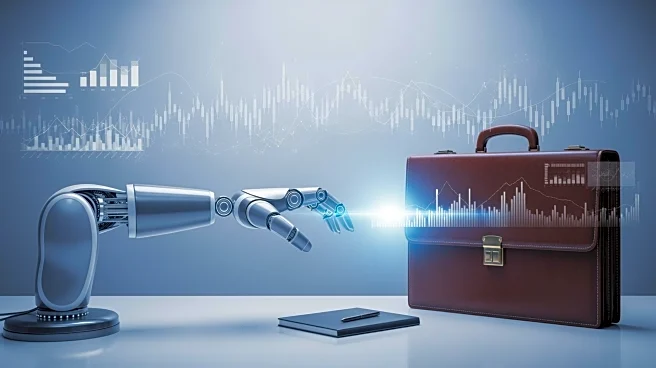What's Happening?
Goldman Sachs CEO David Solomon has expressed optimism about the U.S. economy's ability to adapt to the disruptions caused by artificial intelligence (AI). Speaking at the Goldman Sachs 10,000 Small Businesses
Summit in Washington, Solomon compared the current AI-driven changes to past technological revolutions, such as the introduction of the steam engine. He acknowledged that while AI is advancing rapidly and causing significant shifts in the job market, particularly for white-collar workers, the American workforce has historically been resilient and adaptable. Solomon noted that AI adoption is accelerating, with a Goldman Sachs survey indicating that 37% of clients are already using AI in production, a figure expected to rise to 74% in three years. Despite concerns about job losses, Solomon believes new opportunities will emerge as the economy adjusts.
Why It's Important?
The rapid adoption of AI technology is reshaping the labor market, with potential implications for job creation and economic stability. While some industries may experience job reductions, others could see growth as new roles and businesses emerge. The transition may be challenging, particularly for office workers whose roles are more susceptible to automation. However, Solomon's perspective suggests that the U.S. economy's flexibility could mitigate long-term negative impacts. The broader significance lies in how businesses and policymakers respond to these changes, balancing innovation with workforce support. The outcome will affect economic stakeholders, including companies, employees, and investors, as they navigate the evolving landscape.
What's Next?
As AI continues to integrate into various sectors, companies may need to reassess their workforce strategies, potentially leading to further restructuring and job reallocation. Policymakers might consider implementing measures to support workers transitioning to new roles, such as retraining programs. The ongoing dialogue between industry leaders and government officials will be crucial in shaping policies that address the challenges and opportunities presented by AI. Additionally, the potential for an AI-driven economic bubble raises questions about market stability and investment strategies, which stakeholders will need to monitor closely.
Beyond the Headlines
The ethical and cultural implications of AI adoption are significant, as society grapples with issues of privacy, data security, and the potential for increased inequality. The pace of technological change may outstrip regulatory frameworks, necessitating a proactive approach to governance. Furthermore, the cultural shift towards AI-driven solutions could alter consumer behavior and expectations, influencing market dynamics and business models. Long-term, the integration of AI into daily life may redefine societal norms and values, prompting ongoing discussions about the role of technology in human development.









